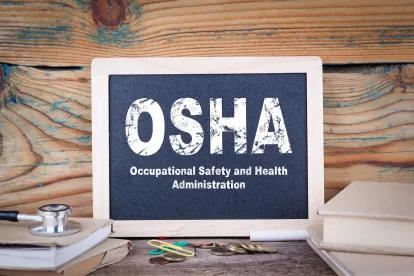On May 19, 2020, the Department of Labor’s Occupational Safety and Health Administration (“OSHA”) issued a memorandum updating previous guidance regarding employers’ obligation to record cases of COVID-19 in the workplace. On May 26, 2020, the previous guidance will be rescinded and OSHA’s updated guidance will go into effect, the key provisions of which are summarized below.
Under the updated guidance, all employers subject to OSHA recordkeeping requirements will now have to determine whether employees’ COVID-19 cases are work-related and, if so, record such cases on the employer’s OSHA Form 300 log. The previous guidance generally exempted employers (aside from healthcare, emergency response and correctional employers) from having to record cases of COVID-19 unless there was “objective evidence” that the illness was work-related.
Specifically, the updated guidance provides that all employers that are not exempted from OSHA’s recordkeeping requirements must resume recording cases of COVID-19 where:
- The case is a confirmed case of COVID-19 as defined by the Centers for Disease Control and Prevention (“CDC”);
- The case is work-related; and
- The case involves one or more of the general recording criteria set forth in 29 C.F.R. § 1904.7.
Notably, the guidance does not alter the exemption from OSHA recordkeeping requirements for employers with fewer than 10 employees or those in certain low-risk industries, such as the legal services, accounting, educational or financial industries. A complete list of exempt industries can be found here.
Considerations for Assessing Work-Relatedness
OSHA acknowledged that determining whether a case of COVID-19 is work-related may be difficult and, as such, stated that it “is exercising enforcement discretion to assess employers’ efforts in making work-related determinations.” The agency will consider the following in assessing an employer’s determination of work-relatedness:
- The reasonableness of the employer’s investigation into work-relatedness;
- The evidence available to the employer; and
- The evidence that a case of COVID-19 was contracted at work.
With regard to the first consideration, OSHA makes clear that employers should not be expected to undertake extensive medical inquires. Rather, employers generally will be deemed to have undertaken a sufficient investigation so long as the employer, upon learning about the employee’s COVID-19 diagnosis, (1) asks the employee how they believe they contracted the illness; (2) while respecting employee privacy, discusses with the employee their work and out-of-work activities which may have led to the employee contracting the illness; and (3) reviews the employee’s work environment for potential COVID-19 exposure, keeping in mind whether other employees in that environment have contracted the illness.
As for the second consideration, the guidance states that evidence of work-relatedness should be considered based on information reasonably available to the employer when it made its determination. However, in assessing the reasonableness of an employer’s work-relatedness determination, OSHA will also take into account any information the employer learned after making its initial determination.
Finally, with regard to the third consideration, absent an alternative explanation for the illness, evidence that indicates work-relatedness may include, among other things:
- Incidence of COVID-19 among several employees who work in close proximity to one another;
- An employee contracting the illness after lengthy, close exposure to a customer or co-worker who has a confirmed case of COVID-19; and
- The fact that an employee’s job duties include having frequent, close contact with the general public in an area with ongoing community transmission.
Conversely, the following evidence may weigh against a finding of work-relatedness:
- An employee is the only worker to contract COVID-19 in their vicinity and the employee’s job duties do not include having frequent contact with the general public; and
- An employee frequently associates with a non-coworker outside of work who has COVID-19, including during the time the individual is likely infectious.
If the employer conducts a good-faith inquiry and still cannot determine whether it is more likely than not that an employee’s COVID-19 illness was work-related, the employer need not record that COVID-19 illness.
Takeaways
Though many employers will again be subject to OSHA’s recordkeeping obligations with regard to COVID-19 cases, the updated guidance does provide a clearer indication regarding how OSHA will assess compliance. On May 19, 2020, OSHA also issued a revised interim enforcement response plan, which notes that OSHA will continue its current policy of prioritizing workplace inspections related to COVID-19 cases. However, in areas where community spread of COVID-19 has significantly decreased, the agency will return to the inspection policy it followed prior to the pandemic.






 />i
/>i


